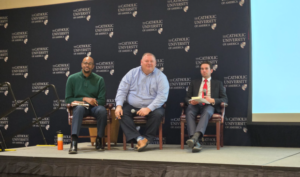Presidential Election: Coronavirus Edition

By Eva Lynch
The novel coronavirus seems to have wormed its way into every aspect of American life, and the upcoming 2020 presidential election and ongoing Democratic primary race are certainly not immune to its effect.
States awaiting their primaries continue to make the safety of their residents paramount, as the toxic stew of mass exposure that would be produced by traditional voting practices—constituents squishing in line, handling ballots and stickers, and touching the same screens—poses a mounting threat. Currently, eight states have postponed their primary elections to at least late May, and some, such as Alabama, until as late as July.
As Senator Bernie Sanders continues to stay in the race with former vice president Joe Biden, currently holding 909 delegates to Biden’s 1,215 as of March 24 2020, and many states’ primary-postponement, it’s looking more likely that the Democratic primary race will run until the final lap at the Democratic National Convention in mid-July. Despite increasingly noisy skepticism from Democrats around the country, the DNC insists that the convention will go on as planned. A candidate requires 1,991 of the pledged 3,979 Democratic delegates to clinch the party nomination.
Though Biden’s primary support has surged, his campaign remains untested against the fallout of the virus, as Biden does not currently hold office and is essentially quarantined in his house. Though he has tried, Biden’s Delaware home is arguably not the most fitting bully pulpit from which to translate the sense of leadership and power his campaign so desperately needs. Analysts expect to see an increase in the Obama administration-focused rhetoric that Biden has subtly employed thus far on the campaign trail.
While the date and location of the twelfth Democratic debate is to be determined amidst the COVID-19 crisis, there is no doubt the pandemic will be the main topic of conversation, no different from many Americans’ daily lives right now. Additionally, analysts are expecting the two remaining candidates to shift from a focus on each other’s shortcomings to convincing constituents to vote out President Trump. The President’s handling of the coronavirus outbreak quickly became a divisive issue, around which analysts expect debate rhetoric to primarily revolve. This shift is already apparent in Biden’s first shadow briefing on the coronavirus, in which he demanded Trump live up to the “wartime president” archetype he has claimed to fulfill.
As the presidential election draws nearer, Trump’s campaign team is reportedly working to change the narrative around the issue, now that the full effect and danger of the COVID-19 outbreak is evident and inconsistent with the president’s initial communications. Faced with endless clips depicting a blasé attitude and an incriminating Twitter rapsheet downplaying the virus later declared a pandemic, Trump’s team is rushing to focus on his recent proactivity, including travel bans, border shutdowns, and more informed commentary. Reportedly, the team’s tactics include providing an explicit timeline of the administration’s actions taken to flatten the curve and an amplification of praise for those actions to follow.
Apart from its devastation of the national economy and stock market, the virus continues to play its hand in the election as well, coloring the early stages and future structure of Trump’s campaign and forcing Biden’s and Sanders’ campaigns to be creative with new strategies.








